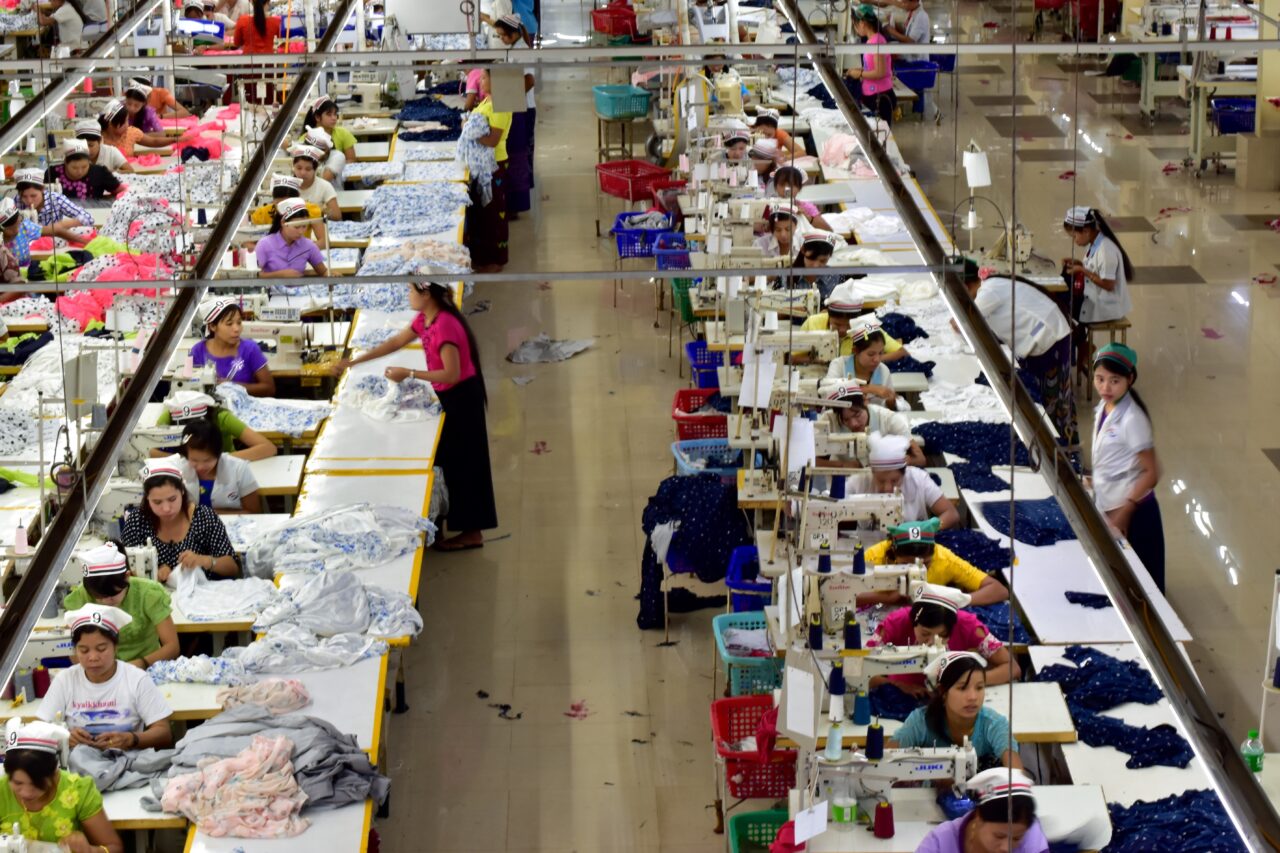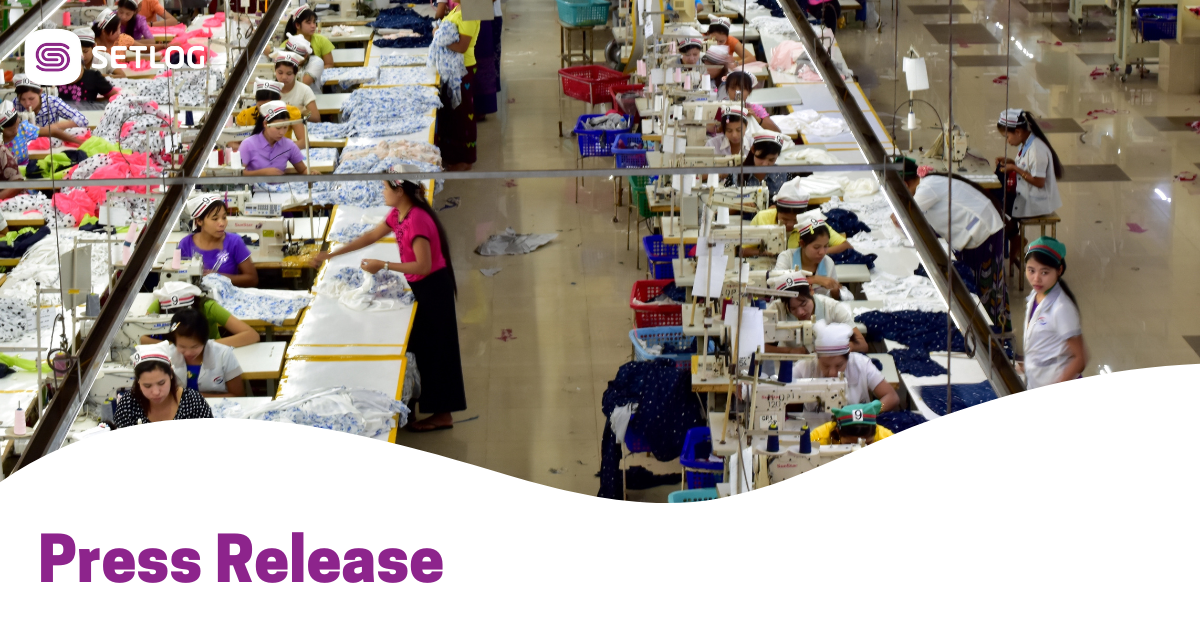- Congestion in customs at the ports results in waiting times of up to three weeks.
- Expert predicts higher prices for consumers in the long term.
- Cost increases put producers under pressure.


Fashion production on two lines: In Bangladesh, goods are held up in customs for up to three weeks. Assumes that many textile factories will not survive their cash flow crisis: Purchasing expert Steffen Günner. Photos: Shutterstock / Bay City
(Bochum / New York, August 20, 2024) The outbreak of violence in Bangladesh, resulting in hundreds of deaths and the collapse of the government, will have long-term consequences for both importers and consumers—namely, higher prices for clothing. Steffen Guenner, Managing Director of Purchasing at service provider Bay City, predicts this outcome. He purchases around 30 million items a year for 20 European brands, retail chains, and discount stores in the world’s eighth-largest country. In doing so, he contradicts association representatives who recently expressed caution about the impact of the riots. “Consumers won’t notice anything in the coming days or weeks, and that’s true. But fashion prices will rise by mid-2025 at the latest,” the purchasing expert warns.
Guenner believes that retailers and discount stores in Germany will have to pass on the rising purchase and transportation costs. Although almost all factories in Bangladesh have reopened after a two-week forced shutdown—due to government-mandated curfews and “holidays” in early August—supply bottlenecks and delays are already occurring. Currently, fabrics that Bangladesh imports for further processing, particularly from China, are stuck in customs at ports and airports for up to three weeks. This is also confirmed by Ralf Duester, Managing Director of Setlog, whose SCM software, OSCA, is used by Bay City to manage supply chains: “We’re currently seeing and hearing about delays of two to three weeks in the estimated arrival time of goods from the industry,” Duester reports. Last week, he analyzed data from 20 companies. Collectively, these fashion brands source more than 25 percent of their goods from Bangladesh alone.
According to Guenner, the issues with customs clearance stem from the fact that vacancies have not yet been filled by the transitional government. But customs is just one of the problems; the other is the damaged infrastructure. Numerous roads and buildings were damaged during the violent clashes between government loyalists, opposition members, and students. As a result, even the bus services that commuters rely on to get to work are no longer functioning properly. “Currently, only about 75 percent of the workforce is showing up at textile factories,” Guenner reports.
This situation puts factory owners and managers under significant pressure: They are unable to meet production schedules and fulfill the delivery quantities often agreed upon months in advance. This, in turn, creates a vicious cycle of partially paid or unpaid invoices from importers and unpaid wages since the protests began in mid-July.
And there’s another reason for the managers’ sleepless nights: Following the textile workers’ strikes, a government-appointed commission pushed through a minimum wage increase of 56.25 percent to 104 euros starting in December a few months ago. “These wage increases have not yet been factored in, along with the rise in energy costs and inflation,” Guenner explains.
He believes that many factories won’t be able to recover from their cash flow crisis. And if wages and salaries aren’t paid, employees will go on strike again. “Some of these strikes aren’t just peaceful. Sometimes, workers even damage their own workplaces,” Guenner explains. He expects that purchase prices, like paying less than a euro for a child’s T-shirt, will no longer be sustainable for retail chains and discount stores in this country.
However, many retail chains—especially those that offer sustainable products—are hesitant to pass on supplier price increases to consumers in Germany. According to Guenner, they think twice about raising prices because low-cost suppliers who don’t prioritize sustainability could then take away their market share.
Both Guenner and Duester worry that Bangladesh could lose its position as the emerging “sewing factory of Europe” and the second most important import country for fashion suppliers in Germany if the situation doesn’t improve, despite its large production capacity. “This would also be a significant setback for climate goals: Bangladesh, which has made great strides since the Rana Plaza disaster, has advanced considerably in this area and is much further ahead than other Asian countries, some of which are still in the early stages of certification. Plus, Bangladesh offers an excellent price-performance ratio for sustainable fashion,” Duester explains. The country’s sustainability initiative, in a nation of around 170 million people, is a beacon of hope for the textile industry. “Importers who want to offer sustainable products are carefully considering whether they should abandon Bangladesh as a production country,” Duester adds.
Contact Setlog:
Nora Breuker, Digital Marketing Strategist
Setlog GmbH, Alleestraße 80, 44793 Bochum, Germany
T +49 234 720 285 78, n.breuker@setlog.com, setlog.com
Contact impact media projects:
Thilo Jörgl, impact media projects GmbH, Eckherstraße 10b, 85737 Ismaning
T +49 89 215384612, thilo.joergl@impact.mp, impact.mp3
About Setlog
Setlog GmbH is a provider of Supply Chain Management (SCM) solutions. The central product is the cloud-based software OSCA with the solutions Purchase Order Management, SRM, Global Logistics, CSR and Quality Control. OSCA, which stands for “Online Supply Chain Accelerator”, is used by more than 150 brands in the apparel, electronics, food, consumer goods and hardware sectors. With the help of OSCA, companies connect their supply chain partners, suppliers and service providers to optimally coordinate their supply chain and efficiently manage supply chains. Setlog GmbH was founded in 2001 and is today one of the leading providers of SCM software with over 40,000 users in 92 countries. The software house employs 60 people at its locations in Bochum (headquarters), Cologne and New York. www.setlog.com
